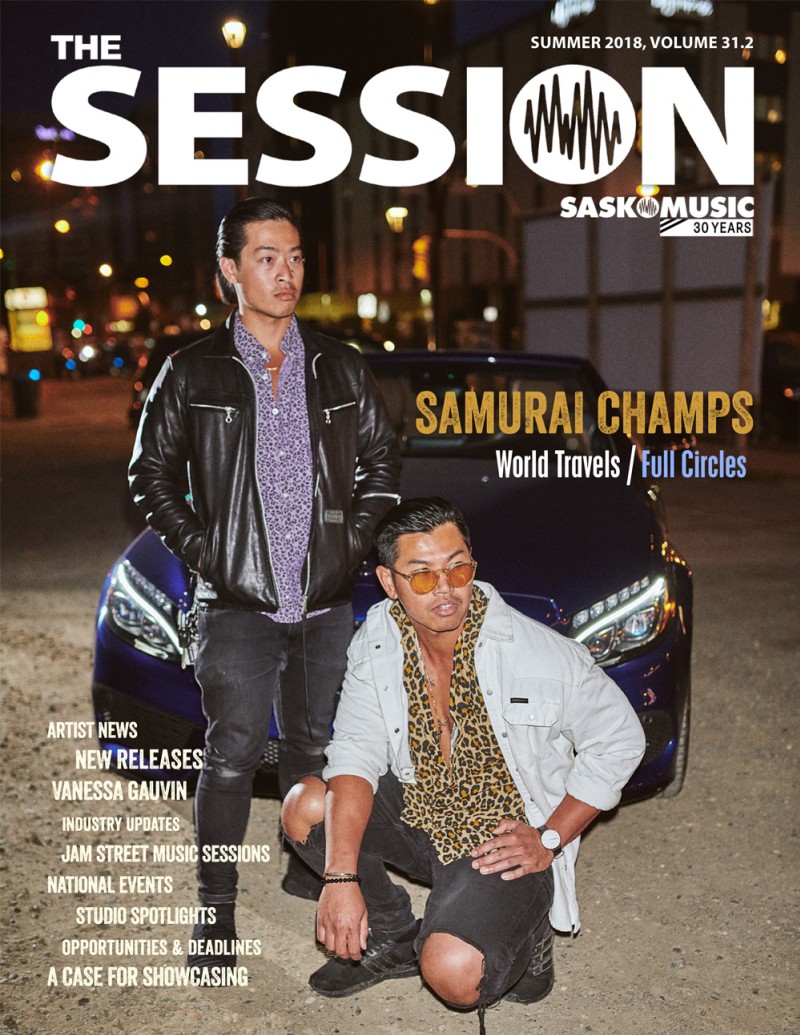PHOTOGRAPHY by Alan Yuen, Insomniak Media
hair by Lewis Oman of Eleven03 Apparel
Comprised of new-wave rapper Savan Muth (Jeah) of Saskatoon and dark-soul/R&B singer Marvin Chan (Merv xx Gotti) of Regina, this hip hop duo has been burning up festival stages from Canada to Texas and the UK, and soon, Asia, as well as garnering acclaim on playlists, placements on best-of lists, and award nominations. If that weren’t keeping them busy enough, they lead the Trifecta Artist Collective, where they help to build the music community and work collaboratively to amplify the careers of fellow artists including LOA, Revilla, XANA, Tefrondon and more.
I sat down with Marvin to chat about the band’s successes, philosophies and hopes for the future.
Tell me how you guys came together as Samurai Champs.
Me and Savan knew each other from (Campbell) high school, though he was a few years older than me. Pimpton’s aunt was the librarian there. Pimpton and Savan were in the same grade and asked to use the library at lunch hour to put on an open mic. So they first started doing hip hop shows in the library. I thought it was really cool, and eventually took part doing acoustic stuff. Once they graduated I took it over and started organizing it in the library and band practice room. We got into a bunch of different genres - hardcore, punk, acoustic. We did go back later on to see what became of it. They now do a whole open mic - Campbell Coffee House, during lunch in the auditorium. So it actually kept going.
That’s amazing. Was it intimidating, being a teen, to get up in front of your peers and perform?
No…Savan was always a really natural performer; and I was performing all over with martial arts, which is quite theatrical. I was also part of the hardcore scene here, doing little shows.
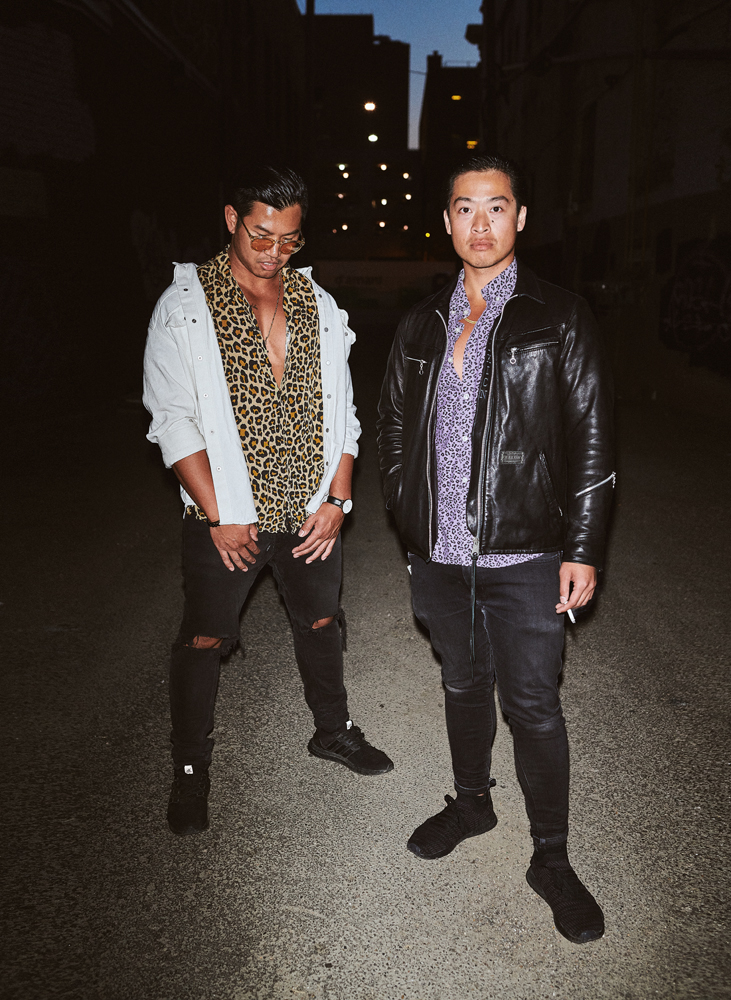
Did that open mike experience carry eventually into the formation of Trifecta, motivating you to work with and help other artists?
It definitely stemmed from that. There were a lot of kids in that high school who were part of the hardcore scene - from The Exchange or the Buffalo Lounge, including Andy Shauf and Nick Faye - some of my first acoustic shows were with those. I was given an opportunity to help out with some shows at the Buffalo Lounge, and now Trifecta is to give others a shot, especially those from a more niche genre. Savan’s big dream has been to open a music school, so the artist collective is like the school side, and the (Trifecta) music festival is the application of the skills.
Where did the original concept for DGS Samurai Champs come from, and why the name change?
Me and Savan always did music together, but separately in high school...he did hip hop, I mainly did indie acoustic stuff, but every once in a while he would do a verse on a track or show, or I would accompany him at his show. At some point the thought was ‘why don’t we do something together.’ I think we knew how to record ourselves enough by then that we felt competent to combine and implement it.
The name was originally DGS Samurai Champs, DGS from one of Savan’s cheeky high school band projects, then we added Samurai Champs to the end because we’re both really big into anime. Anime as a whole does a good job of incorporating American hip hop with Japanese fuedal foklore. There’s one specific episode where the Samurai win a battle contest because they take a different approach with discipline, strategy, and patience. We approach hip hop not in that traditional aggressive way, but try to do it more strategically and intelligently, using discipline and patience. Mainly the name came from that cartoon! And dropping the DGS...it was always being spelt wrong, but the change also represented us maturing into our sound. It represents the methodology with which we want to proceed with our music: our strategy of making industry relationships, focusing on incremental online growth, that kind of thing.
We first started practicing together in the fall of 2013...but we don’t feel like we started taking things seriously until spring of 2016, I think. We had just gotten into Canadian Music Week and Reeperbahn, and started to figure out the approach we really wanted to take. We like the concepts outlined in the book “Powers of Two: Finding the Essence of Innovation in Creative Pairs.” In our case, Savan is really good at being open to the universe, and I’m good at planning.
When you do these big shows, what’s the band formation?
We really try to bring the whole 5 piece out now. Luke Baird and Logan Tammer, our drummer and bassist; and our DJ Tefrondon. In software there’s a huge emphasis on modularization - if you need to take out one component of software it doesn’t break the entire system, you can swap in another part. With our first mission to SXSW, in our pitch for the showcase we said ‘we can play as a 5 piece, we can set up and tear down quick with just us two and a DJ, or our DJ can perform alone.’ Being able to fit to whatever circumstance. It’s definitely more exciting to go as a five-piece, and we try to do that as much as possible.
Tell me how you go about preparing for a showcase.
We practice quite a bit. Some hip hop artists don’t treat the art like a practice, and we decided to approach it like you would athletics. You wouldn’t show up for a game and say “I’m here.” You go to practice, do drills. Even without the band, we always make sure we do that - we practice as the core band, but we also practice with missing members so that we know what to do in that circumstance. Even with different DJs, there’s a different chemistry. Lately we’ve been trying to see if we can play a show under really stressful conditions and artificially creating circumstances. For example, we tried doing a practice completely in the dark, or with earplugs in so we can’t hear anything. I feel like we’ve been able to persist through challenging shows, even if we’re flying blind, say with no monitor mix.
Extreme rehearsal. That’s a really good idea - for anybody.
One thing I’ve tried to emphasize is, as with martial arts you learn so many techniques, but when you’re in the moment technique breaks down. Nervous, scared, anxious - you may not remember how to fight, you just react. We did this for SXSW: we didn’t just have rehearsals in our rehearsal space, we booked secret shows in garages, and open mics so we could deal with different real life situations.

After all that prep, how did your SXSW showcase go? Did anything crazy happen that you’d prepared for?
Our first set was as a duo, and that went really good; our first band showcase went alright, but we adapted more for the second band showcase. Transitioning from other genres, like a rock band, on the schedule before us can be strange to get right, so we corrected things on the fly, and from that one we got booked for a Singapore festival (Music Matters Live). It was because of all that prep - maybe unnecessary prep.
Clearly you’re going to come across different challenges as you keep playing, and eventually those practices will come in handy! And how do you decide on your setlists for these high-pressure shows, as opposed to regular club sets?
We have a standard set we do for showcases, but a lot of the structuring of our regular set list is from the Tom Jackson performance workshop (presented by SaskMusic and Creative Sask). We try to attract the crowd with the first 3 songs. But say if there was a heavier band on before us, we’ll try, depending on the band and crowd, to go in just as heavy to keep the energy up. Or just to differentiate ourselves we’ll start with a completely acoustic track.
So you can be changing up your showcase set right before you go on?
Ya... and that’s something we try to plan as much as possible in advance - we look up what other bands we’re playing with on a bill, especially if we know them. And then try to plan accordingly, both so the whole show can flow, and to make sure ours is still distinct.
You did an impressive string of export events just recently. Could you talk about how those went, and your impressions of the different events?
I do try to think of every showcase, festival or event kind of like they’re different bands - and this might be coming more from the Trifecta experience, as we know what it’s like to organize a festival. Seeing how different teams approach organizing events really does affect the personality of the festival. An example would be Tallinn Music Week in Estonia; that one was really community-based, everything was super forward-thinking for culture and arts, and it might have more to do with the civic culture (of the place) in general, because they treated the festival like how people here treat the Riders. Everyone was all about the festival, from the bus drivers to the trains and so on. The good thing was everyone was attending with the intent to look for a new band, not just see something they’re familiar with already. The lucky thing with that is you can almost treat those showcases like a regular show.
Whereas something like SXSW, that’s different as there are so many unofficial showcases presented by brands…then there are the official ones which are more industry-facing. For some of our guys, it was their first time playing strictly to industry where you don’t know if they’re really into it. It’s their job to see X many bands per week, so even if they’re on their phones through the set we’re just like ‘don’t worry, they’re doing their job; we just have to do ours, play as best as we can,’ and if anything, we’re just playing to each other.
Another that felt very nice in the community sense was Focus Wales. We went to support (Trifecta artist) LOA last year, and the town was almost like Moose Jaw - everybody comes out from the town, but the industry is there as well. Because it’s so intimate, industry are more inclined to pay attention, which is really different from SXSW where you really have to work to get industry to your shows.
Did you feel, at SXSW in particular, that you were able to make an impact and not get swallowed up into the machinery of that huge event?
Ya I think so, but I think we were really lucky, as I’ve heard so many horror stories of people going and not getting a lot out of it. We had Rev. Moose from Marauder guide us, as well as (SaskMusic’s) Mike and Kaelen, and friends like Close Talker. What Chris (Morien) from Close Talker said was they went the first time, came back and said ‘let’s never go back.’ Then they went again and said the same thing. It wasn’t until the fourth time that they got something out of it because they learned from their past mistakes. They told us lots of really good ways to prepare for it, like make sure your gear is easy to carry as there’s just so many people and chaos. Be prepared for bad sound. Make sure you email industry well in advance and plan it out as much as you can. Because we had the right people helping us prepare for it, I feel like we got as much as we could out of it for our first time. We ended up playing 5 times and got invited to ‘the SXSW of Singapore,’ so that was good.
So you would go back again? Do you think you could go further with the opportunity the second time?
We would go, but not next year. We’d take more time to build up and prepare. We talked to other bands who were showcasing, all coming from different places in their career; if you don’t prepare it’s a really hard one to get results from. It really depends on what level you are at already before you go.
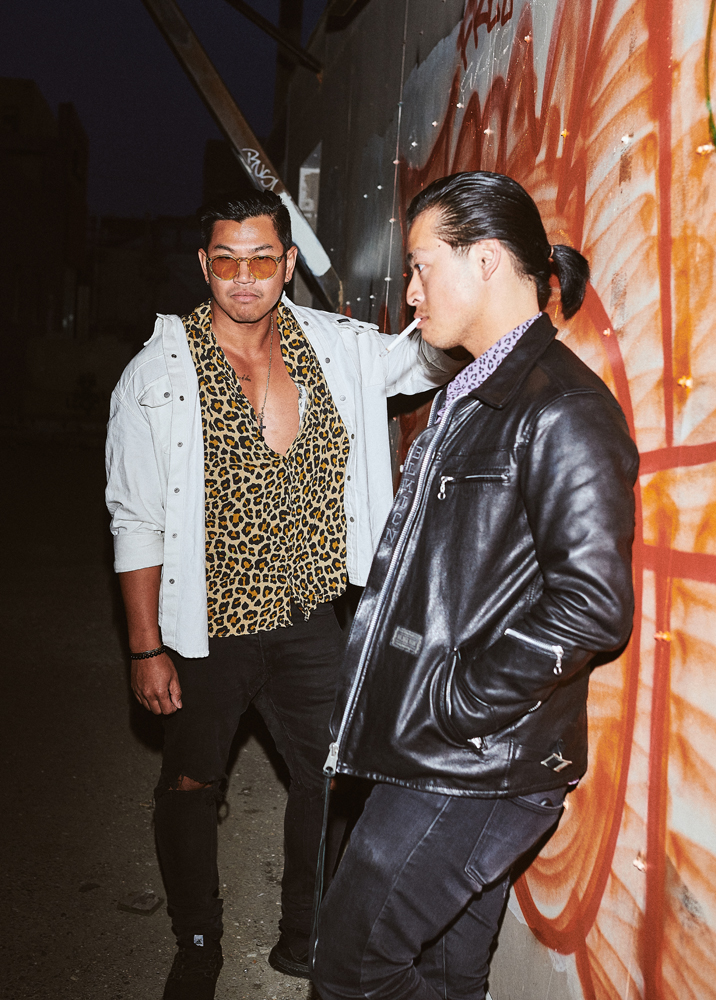
Out of all the showcases you’ve done, is there one that stood out as the most beneficial?
It’s always kind of different for us, being a hip hop band from Sask. We’d like to say it was SXSW, as they have such an emphasis on hip hop, but honestly the three that were the best for us were probably Tallinn Music Week - because of the Japanese delegation and we’re looking to get into southeast Asian markets. Upstream, which is a new event, was more general public facing but we made a lot of new fans there. And NXNE was really good for us. It was fun being able to play with other Saskatchewan bands on a bill, but also the type of hip hop we do is a sound that is largely coming from Toronto right now. It was a way for us to connect with Toronto’s hip hop community, which feels really mandatory if you play this type of music. That showcase included us, Nick Faye, and the Surf Dads – bands we played with at the Buffalo Lounge years ago. It was really interesting to play somewhere else in different bands with different sounds and see where each of us has gone with it.
You recently played the Passport: Music Export Summit (a Canadian event geared to preparing export-ready Canadian artists and music entrepreneurs with business skills and artistic product development). Did you learn a lot there?
Honestly, in terms of education we definitely did and got the most out of that event above others. The way it was structured was impressive, as opposed to the business-to-business meetings at most events (there’s only so much you can get to know a person in 5 minutes). At Passport, the industry looked the artists up beforehand, prepared, and had strategic things to recommend to us. It really put things into perspective, whether for a manager or self-managed artist. It was really beneficial.
This is a side note, but it’s important to us from the Trifecta side: in the beginning when they were introducing everything, they made a point to say that while putting things together on a very tight timeline, and dealing with the crazy schedules of bands and managers, they tried really hard to make a culturally, ethnically and creatively diverse cohort with everything. I felt they did give it a valiant effort, with lots of female representation, genre diversity, and culturally diverse backgrounds. Also diverse in terms of approach, which I always look for: we’ve pursued the showcase/festival/export stuff as we know our market, and we’re also a live band. That’s our approach. But (Passport participant) Nuela Charles has done really well in sync, so we can learn from her. Then AHI is doing crazy good on Spotify playlists, so that was really cool. Would recommend people attend this, 10/10.
I think a lot of times people get hung up on the term ’export’ and feel it doesn’t apply to them or get scared off of applying, when it really just means, you want to find your market and that market may not necessarily be here.
Everyone just wants their music to be heard, and it’s just about targeting the market that wants to listen to you. For example, obviously a hip hop band isn’t going to do as well here as somewhere else.
I’d like to hear how you approach songwriting. What’s your first step?
Savan has the best term for this, he calls it ‘catching a feeling.’ For us it always needs to start with an emotion and that may come out of nowhere – traveling, watching a movie, or listening to a song that triggered an emotion. Right then we stop what we are doing and catch it. It’s almost like the song already exists, and for a glimpse in time the universe is giving you a little thread. Because it’s there it’s your job to try and unravel it as much as you can. The worst thing to do is just leave it til later and think you can get back to it, but then the feeling is gone.
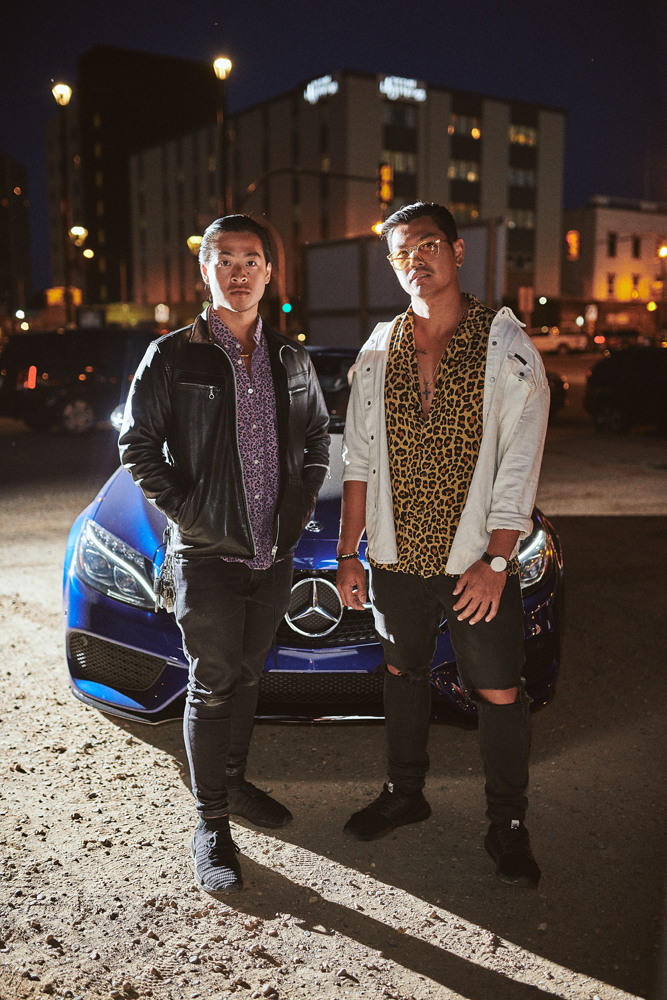
So if you have an idea that’s got you inspired, do you contact Savan right away and get together to work on it?
When it starts it’s independently. Sometimes we’ll unravel it as far as we can and get stuck, then call on the other. Or we unravel it to a good point, but it could be made better if ’this part’ is taken by the other person.
And do you both collaborate on all aspects of a song – lyrics, beat, instrumentation?
We both work on the lyrics; sometimes Savan will complete a song lyrically, but then hand it off to me to sing. Or there may be parts I can fill in between his rapping. We are really fortunate to have known each other so long that if has something he can’t quite communicate, he knows I’ll be able to find what he’s intending. And the reverse. By the end of the finished product we are always happy.
Where editing comes in more is the vocal layering. Music is made for repetition. Classically you would try to make very complex progressions of music and then incorporate repeated parts that would be easy to remember. Now in hip hop, the interesting component, the intrigue, is the textures you make. So the editing will come in with Savan rapping certain parts and leaving gaps between each bar; the texture will be figuring out what to fill those with, how many vocal layers to harmonize, etc.
Are you both building in the musical elements?
Savan takes care of staying up-to-date with contemporary hip hop song structure, which may have a lot of repeating parts, or not; then I’ll make sure all the layers, texture, are there. I’m classically trained, so I’ll make sure things are musically sound. One example: with a new track, he’d written a song that he wanted me to sing; but to me the whole intrigue of our dynamic is the contrast between our two voices. He raps and I sing. But I felt Savan needed to try singing a bit on this one, so we spent time working up a part for his voice, and in the end we’re so happy with the recording.
You have a distinctive vocal, and the contrast of your two voices is integral to your sound…have you always sung in that style?
I am, very stereotypically, classically trained on piano, and I took singing for a bit. I actually didn’t really like music growing up…Then I got a guitar in a garage sale, and all I wanted to do was play in a band. And one day one of the band’s singers didn’t want to sing, so I tried it and it kept progressing from there. For some reason that’s the vocal frequency that vibrated with me. Most of the bands I listened to were those 2000s-emo bands that sang in a higher register. And then The Weeknd caught on.
Savan listened to the classics like Biggie, and would rap along. He was always freestyling to everything and developed his voice that way. So for us both it was mostly learning by doing.
Being a genre that changes so rapidly, do you make a conscious effort to stay on top of the current sounds and arrangements? Do you feel any pressure to follow trends?
We’ve always kind of felt like an odd one out in the hip hop community. There are definitely a lot of artists who follow trends, but we don’t want to sound like the trends. There are also those who keep it really traditional, but then don’t have a lot of commercial options.
For us, since Savan comes from a traditional hip hop background but is also really in tune with contemporary hip hop, and me, coming from not a hip hop background at all…we’re always trying to find this middle ground. Our biggest influences right now are the Toronto sound, maybe it’s being Canadian and spending all that time indoors in the winter…the sounds are darker, colder, more ominous.
Trifecta is based off of this collective in Los Angeles called Soulection; they started what they called ‘the new sound of tomorrow.’ We coined the phrase ‘the new sound of the prairies’ from it. They took a completely different approach to hip hop – a bit of soul, a minimal sound but using a lot of electronics. It was still with the warm sunny tones of LA. We fit somewhere in the middle, so maybe we haven’t been accepted as much into some hip hop circles, but that’s okay because then we get along with other sounds and other bands.
How commercial are your goals – are you interested in radio play, for example?
It always depends on the song. Because Spotify playlisting is such a prevalent factor in everything now, people will almost write songs ‘for the playlist’. But Savan and I, our #1 thing, since our songwriting is based on catching a feeling, if we happen to write a song that lands on the radio that’s good; but it’s still gotta be a song that really resonates with us. Maybe it’ll just live in the Soundcloud world, and we know it’ll translate live; maybe it’ll translate into radio one day. For us, we just wanna keep making and playing songs that we feel good about.
What kind of material can we expect on your next album?
Creatively speaking, still the ‘catching the feeling.’ Hip hop is a singles market now so the plan is to release singles around key career opportunities - we’ve done two singles recently - then when the time is right we’ll release an album. At the time of prepping the release, maybe for spring 2019, we’ll pick what songs will be on it. But we always pay close attention to how the album flows. Both of us, despite the trend, are really full album people.
And how about the video-making process...how do you approach that?
Typically it is similar to the songwriting. The ‘Crayons’ concept was Savan’s idea, mainly representing diversity, and due to the Trifecta community we always have lots of extras (laughs). When a song calls for it we have a narrative thread; I also really like the live performance aspect in videos.
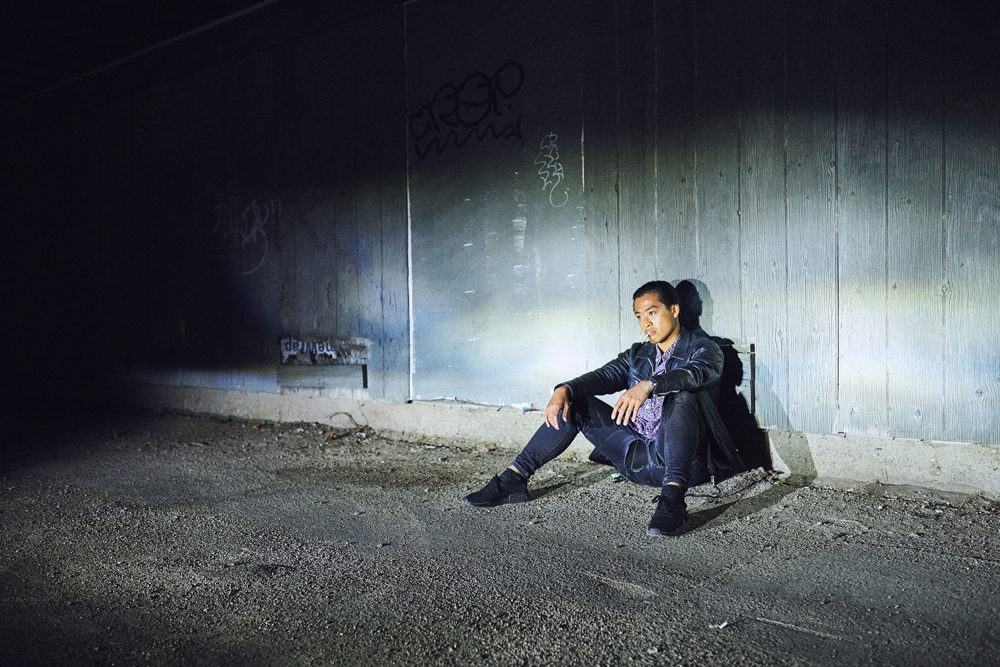
The overall brand as the band: Do you make decisions consciously about how to present yourselves?
In letting it roll we’ve found the personality we want to have. It’s really just our personalities conglomerated, but that is comprised of how much we emphasize community, especially growing up and where we’re from, as well as our cultural heritage. I know there are a lot of artists who identify their cultural heritage, and others who argue the music should just speak for itself. For us, not just our music but our whole approach comes from our heritage. My parents met in Canada but didn’t share a common language – they met while at school as exchange students …Savan was born in a refugee camp in Thailand. Both of us doing music together, being given the opportunity and choice to live here, but being able to go back to Asia through music, where else is that gonna happen?
It’s so great when music affords those experiences.
Luke and Logan, our band members - while I was in the hardcore scene here, they were in Swan River MB organizing hardcore shows there. We grew up watching the same bands touring through the prairie circuit. They moved to Sask. but had never really travelled. That’s another nice part of story; us being able to go to Asia and see new things, but also see how that will be experienced by two dudes from a small Manitoba town that never thought they’d leave Canada. That’s a trip.
Who do you look up to in the scene right now?
Can I go by layer? In Sask. specifically, SaskMusic’s Mike and Kaelen have been very helpful and real with us. On the artist side, Drake represented a really big switch in North American hip hop. Combining singing and rapping together, and showing a healthier side of masculinity in hip hop - you don’t have to be bravado all the time. He also incorporates other cultures – dancehall, Afrobeat, all integrated, and exposed other artists to a North American market.
The other two we admire are Chinese singer Anders from Toronto and Manila Grey, a Filipino duo from Vancouver. For us, trying to increase southeast Asian representation in music, it’s really sweet seeing two other urban acts from larger Canadian centres that are demographically atypical of hip hop doing really well.
And when people ask influences, for us it’s Bruce Lee. Up until then everyone had a stereotypical version of Asian males but Bruce Lee came at it in a very different way.
Who would we wanna open for? Travis Scott. I feel our energy level would match. And Jazz Cartier. One big thing for us is making an exciting live show. (We admire) artists who experiment with theatrics, visualization and new technology. In terms of pure musicianship, Smino. He’s with the Soulection collective, he plays with a full band, really technically tight and has a strange new delivery of rap. We saw him at Upstream after being fans for a long time, and it was pretty magical. It’s really cool being fans of an artist and then being able to play the same festivals as them.
So stylistically, with what Drake brought…do you feel he put Canadian hip hop ‘on the map’ and brought it to the U.S. market?
He’s always made it very up front that he’s from Canada and I think that has benefitted urban music as a whole. It’s okay to be proud. Even artists like Daniel Caesar now, and Sean Leon waves the Canadian flag hard – we saw this at SXSW.
Do you feel a difference you’re received in a certain way, as a Canadian artist?
Ya definitely. In Europe especially, as soon as they know you’re Canadian. Sonically too we notice it’s a good thing. In the UK last time we asked people why they like Canadians so much, and they said we’re just hungrier than other bands. We’re willing to travel huge distances. “You’re crazy, you drive hours in snow just to play one show?” (laughs)
Where would you like to play next?
Honestly, our eyes were on SXSW for a long time. Now, maybe commercially-facing festivals alongside newer hip hop acts. Osheaga would be one. Our live show is the thing that really connects. Maybe it’s because people spend so much time on their phones, that when you actually get to see a real band, it really binds that relationship. I know our sound doesn’t fit traditionally in one genre. We’ll be focusing on live stuff and online for the next while, building up the social media and digital strategy.
And do you feel you’re getting to a point where you need to expand your team?
Ya, we know what we have going on is good, but we’re definitely looking outward for things like publicity and digital media now. We want to be efficient, but things change so fast in those areas that we just don’t have time. And this is the first time we’ve thought about looking outside for an agent and manager. We’ve been fine so far. I’ll still tell emerging artists that first, they need something to manage/something going on, and also, what makes you think someone else is gonna do that job well? Who are we going to meet that cares about us the same way that we care about each other? That’s something that was built over years.
What’s one feeling you want people to get out of your live show?
Your face blown off? (laughs) To feel like you’ve gone for a crazy ride, but also maybe that you’re really emotionally invested. We focus on the term ’suspended in disbelief.’ We want them to be fully present in the moment.
How do you personally consume most of your music?
We both stream a lot but I’ll still download albums. We both still like long form stories, long movies, long anime series, full albums. Even on Spotify where most people listen to playlists, we’ll put on an entire album.
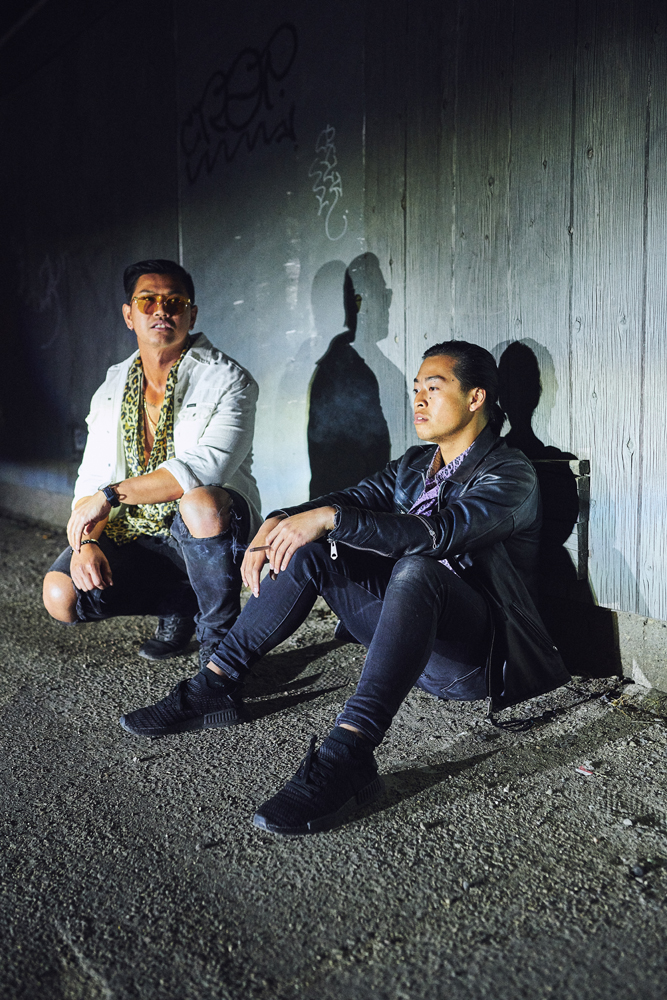
Is that your discovery tool as well?
Ya, we still use Soundcloud quite a bit. Soulection has a weekly radio show. But because we have Triefecta and several DJs involved, their job is to the find new music and that helps!
What’s been your proudest moment thus far?
Usually people say it’s getting onto a certain bill. For us it’s the human part, something like all of us renting bikes after a show. Or after SXSW when the whole band was on the top of a hill at night looking at the city. Nothing super exciting, but the way things lined up where we were actually present with everyone else who was there. With Trifecta it’s not about the big action movie moments, just that feeling where everybody is together.
Have you developed a band strategy - do you have your next 5 years mapped out and goals set?
We used to just let things just unfold, but now we’ve really found we’re able to plan a bit in advance. The most important thing is to stay adaptable. We can plan to be in a certain place, tour somewhere or play a festival, but then what happens - the collisions that happen and the people you meet, that’s up to the universe I guess.
That’s a great way of putting it. So do you ever go into a showcase with certain expectations?
There’s always things that we aim for, but they’re pretty loose. We know how serendipitous these things can be. We argue against ‘getting discovered’ - everything needs to be deliberate and we work hard towards it. We plan, like sending emails out before every show to industry, and prepare as much as we can but that’s still only 50% of the game. The rest is being open to letting the universe throw stuff to you and then knowing what to do when that happens. Starting in 2016 our goal was to play more festivals and meet the people we need to meet. So now that happened, maybe a little bit too much so. Now we’re shifting focus to online communities.
Do you feel the sense of momentum in the band – with the press, playlists, showcases - does it feel to you like stuff is really building?
Not to the point that we feel ready to let go and slack off. We both are sincerely interested in other artists’ lives, and this is difficult because so much of ‘the artist life’ is fantasized. We’re grateful for the stuff we’ve done so far, but we know that doesn’t mean we’ve made it. It’s just necessary growth. Though we’re trying to get better at pausing to enjoy the moments of success as they come.
That’s why we feel almost obligated to do Trifecta. We know what it’s like to be both visible minorities and creative minorities in Sask. We don’t want other artists to have the same pains we went through. Helping coach others helps keep us in check. Ego is such a part of hip hop, we’re always checking ourselves with “would the 21 year old us be happy with what we’re doing?”
We wanna make sure our live show is the most fun somebody has. To sustain our local community. And be role models for those underrepresented. Whatever you do or implement, is a product of how much you care.
To follow their next career moves, visit www.samuraichamps.com
Facebook https://www.facebook.com/SamuraiChamps.
Twitter https://twitter.com/SamuraiChamps
Instagram https://www.instagram.com/samuraichamps/
This interview was published in the Summer 2018 edition of The Session magazine.
Read the digital copy of the full magazine here.

